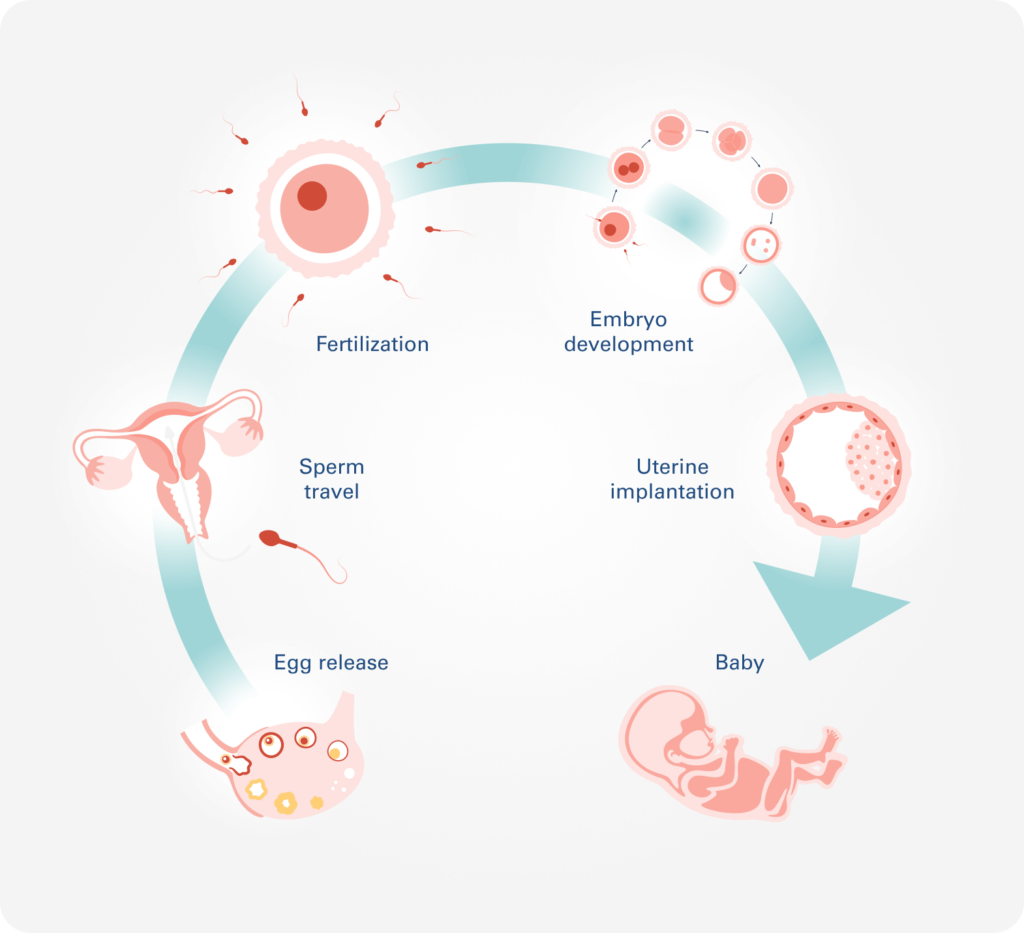Common Signs of Infertility
Dealing with infertility is one of the most difficult experiences someone can go through. That’s why the fertility clinics of The Prelude Network® place such high importance on providing patients with unparalleled support, education, and guidance. We have a deep understanding of the emotional highs and lows that individuals can go through during their fertility journey, and are dedicated to providing both expertise and compassion.
- How do I know if I'm experiencing infertility?
- Common Signs of Infertility in Women
- Common Signs of Infertility in Men
- Signs of Infertility: Additional FAQs
How do I know if I’m experiencing infertility?
Infertility is defined as the inability to conceive or sustain a pregnancy. The primary sign of infertility for both
Infertility is defined as the inability to conceive or sustain a pregnancy. The primary sign of infertility for both men and women is the inability to get pregnant. While that definition may sound simple, the landscape of infertility is exceptionally complex and varied.
The mechanics of getting pregnant are far more complex than many people realize. Many factors must line up perfectly so that the egg and sperm can be in the right place at the right time. And even when that does happen, it still doesn’t necessarily guarantee a successful conception or pregnancy. The human body is complex, and the process of reproduction is even more complex.
At the bare minimum, conception starts with high-quality eggs and sperm. Eggs and sperm are reproductive cells that contain a copy of a person’s genetic code, also known as DNA.

In the average female, one egg per month reaches maturation and is released from the ovaries into the fallopian tubes, in a process known as ovulation. For conception to occur, sperm must travel to the fallopian tubes at the exact moment that an egg is there. Because mature egg cells have a lifespan of only 12 to 24 hours, the sperm have a limited window to fertilize it.
Sperm first develops in the testicles and takes approximately 90 days to reach full maturity. Once matured, the sperm are mixed with seminal fluid, which helps transport the sperm out of the body and provides sperm with energy. During sexual activity, the semen, which contains about 250 million sperm on average, is ejaculated out through the urethra.
From there, the sperm goes through what is often referred to as a journey, as the sperm must travel through the vagina, cervix, uterus, and fallopian tubes to reach the egg. Meanwhile, almost every part of the sperm’s journey is wrought with various obstacles and barriers. This helps to ensure that only the strongest sperm survive. By the time the sperm reaches the fallopian tubes, only about 1,000 out of the original 250 million have survived. Of that 1,000, only about 20% of them will make it to the egg. Finally, only one will fertilize the egg by penetrating through the egg’s outer protective layer.
Once the sperm has entered the egg, the two cells fuse into one cell, forming a zygote, which is the very first step in embryonic development. At this point, the zygote begins to descend down the fallopian tubes and into the uterus. During this descent, the embryo is a ball of rapidly dividing cells. After about five to six days, it reaches the blastocyst phase of embryonic development. Meanwhile, the female’s body releases luteinizing hormone, which is a hormone that prepares the uterus for embryonic implantation. Within a day or so, the blastocyst will embed itself into the endometrial lining of the uterus. Once the embryo has been implanted, you are considered pregnant.
What seems like a simple process from the outside, is actually a highly complex, coordinated series of multiple biological processes.
Want to talk about fertility?
You’re in the right place.
Common Signs of Infertility in Women
When it comes to female fertility, the primary factor to take into consideration is age. Women are born with a set number of eggs that diminish in quantity and quality over time. The ovaries typically start with about 6 million eggs; however, by the time the baby is born, the baby’s ovaries will only have between one to two million eggs left. By the time they reach puberty, the ovaries only have about 300,000 to 400,000 eggs left. Of these several hundred thousand eggs, only a few will ever be developed and reach maturity. Every month during a menstrual cycle, the ovaries release one mature egg and lose 1,000 immature eggs. By age 35, women on average only have about 80,000 eggs left.
Although age is the main factor in infertility, it’s not the only thing to consider. There are other signs that can indicate a fertility issue.

Menstrual Issues
During ovulation, which is when the ovaries release a mature egg into the fallopian tubes, the body sends hormonal signals to the uterus to prepare itself for embryo implantation and pregnancy. In response, the uterine lining (also known as the endometrium) thickens. However, if no pregnancy occurs, the endometrium will shed and dispose of itself out of the body through menstruation. On average, this happens once a month on a fairly consistent schedule.
Because menstruation is tied to ovulation, irregularities with your period are often a sign of issues with ovulation and fertility. Some unusual period symptoms that indicate an issue include irregular menstruation, very light periods, heavy bleeding, and no periods at all.
Pain During Sex
While sex is not always a comfortable experience, it should never be painful. If you’re experiencing pain during sex, it’s often a sign of an underlying health condition that is impacting your reproductive system. Many women dismiss pain during sex, thinking it’s normal. While minor soreness or discomfort is probably nothing to be concerned about, chronic or intense pain during sex should be discussed with a doctor. Pain during sex is a common symptom of several conditions that can impact fertility, including endometriosis, uterine fibroids, polycystic ovarian syndrome (PCOS), and pelvic inflammatory disease (PID).
Hormone Changes
Another sign of infertility in women is hormonal changes. Unlike irregular periods and pain during sex, hormonal changes can sometimes be more difficult to recognize as symptoms. Some common signs of a hormonal imbalance in women include:
- Changes in appetite
- Fluctuations in weight (sudden weight gain or loss)
- Sleep issues
- Reduced libido
- Vaginal dryness
- Hot flashes
- Night sweats
- Chronic acne
- Dry skin
- Brain fog
- Gastrointestinal issues (e.g. bloating, abdominal pain, diarrhea, nausea, etc.)
- Chronic fatigue
- Mood swings
- Depression
- Anxiety
- Hair loss and thinning
- Chronic headaches
Although many of these symptoms don’t necessarily indicate an underlying health issue, they can be a sign of a hormonal imbalance and, potentially, infertility.
Talk to a reproductive endocrinologist today about your fertility.
Common Signs of Infertility in Men
Just like with women, the most common sign of infertility in men is the inability to conceive. Some men also experience other symptoms that indicate a fertility issue, especially if they are over the age of 35. Although men can continue to produce sperm at older ages, the quality, quantity, and motility of said sperm are more likely to decline with age.

Sexual Function Issues
Male infertility is most often associated with low sperm count, low-performing sperm, abnormal sperm function, or abnormal sperm structure. This can sometimes be tied to sexual function issues, which can include ejaculation disorders, diminished libido, pain or discomfort in the reproductive system, structural issues, and erectile dysfunction. All of these symptoms can indicate an issue with fertility.
Hormonal Imbalance
Male infertility is often connected to a hormonal imbalance. Some of the signs of a hormonal imbalance in men, like erectile dysfunction, are noticeable in an obvious way, but many of the signs are far more nuanced. Some signs of a hormonal imbalance in men can include:
- Increases breast tissue growth
- Loss of muscle mass
- Cognitive issues
- Memory loss
- Fatigue
- Loss of libido
- Hair loss
- Changes in mood
- Changes in urination
- Changes in blood pressure
- Sleep issues
- Depression and anxiety
Many of these symptoms are things people experience every day. In many cases, these symptoms aren’t necessarily anything to be concerned about. However, they can be a sign of an underlying hormonal imbalance, which ultimately has an impact on fertility.
Talk to a reproductive endocrinologist today about your fertility.
Signs of Infertility FAQ: Learn With Prelude
Connect With a Prelude Specialist About Infertility
Being diagnosed with infertility can be an emotionally challenging experience to process, which is why the fertility specialists in our network of fertility clinics are dedicated to providing our patients with unparalleled expertise and compassion. No matter what fertility challenges you are facing, The Prelude Network® is here to serve as a source of support and guidance. If you have any questions about fertility, the signs of infertility, or potential treatment options, connect with Prelude today.






